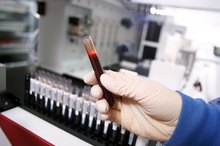What does fact checked mean?
At Healthfully, we strive to deliver objective content that is accurate and up-to-date. Our team periodically reviews articles in order to ensure content quality. The sources cited below consist of evidence from peer-reviewed journals, prominent medical organizations, academic associations, and government data.
The information contained on this site is for informational purposes only, and should not be used as a substitute for the advice of a professional health care provider. Please check with the appropriate physician regarding health questions and concerns. Although we strive to deliver accurate and up-to-date information, no guarantee to that effect is made.
What Are the Causes of Elevated Platelet Count?
Platelets are also called thrombocytes. They are small fragments of large bone marrow cells (megakaryocytes) that clump together to assist in the clotting of blood. Thrombocytes are smaller than red and white blood cells. A normal platelet count is about 150,000 to 400,000 per milliliter of blood. Thrombocytosis describes an elevated platelet count above 400,000 per ml. There are several conditions that could cause an elevated platelet count such as anemia.
If you are experiencing serious medical symptoms, seek emergency treatment immediately.
Definition
According to the Mayo Clinic, thrombocytosis (too many platelets in the blood) is a disorder also known as reactive thrombocytosis that may affect children and adults 2. An elevated platelet count is an indication that there is an underlying condition that is causing the disorder. The test to measure how many platelets are in your blood is called a platelet count.
Function
Causes of High MPV Blood
Learn More
Platelets or thrombocytes are made in the bone marrow; these tiny fragments are then released into the blood. Platelets are activated as the first responders to protect damaged cells when there is bodily injury to the blood vessels or tissues. Their sticky composition starts the clotting process to prevent hemorrhage. Too many platelets in the blood can cause blood clots that may cause strokes or heart attacks. Defective platelets may cause hemorrhaging, or unstoppable bleeding.
- Platelets or thrombocytes are made in the bone marrow; these tiny fragments are then released into the blood.
- Platelets are activated as the first responders to protect damaged cells when there is bodily injury to the blood vessels or tissues.
Causes
According to Netdoctor.com, the two basic processes involved in a high platelet count are: The cell within the bone marrow produces more platelets, or less platelet matter is removed from the blood by the spleen. The latter only occurs after a splenectomy (an operation to remove the spleen) is done. Increased platelet production is usually the cause of an elevated platelet count.
- According to Netdoctor.com, the two basic processes involved in a high platelet count are: The cell within the bone marrow produces more platelets, or less platelet matter is removed from the blood by the spleen.
- The latter only occurs after a splenectomy (an operation to remove the spleen) is done.
Other Causes
Polychromasia Causes
Learn More
The other causes of an elevated platelet count may include anemia (too few red blood cells), certain types of cancer and polycythemia vera (too many re blood cells.) An elevated platelet count could also be casued by early chronic myelogenous leukemia, a malignant disorder that involves abnormal accumulation of white cells in the bone marrow and the blood stream, or by a recent splenectomy.
Additional Causes
These include primary thrombocytosis; this is a high platelet count due to a blood disorder affecting the make up of the blood itself. In addition, reactive thrombocytosis may occur, which is an elevated platelet count that may be due to an infection, an operation or an acute blood loss. Reactive thrombocytosis may also be caused by inflammation due to such causes as rheumatoid arthritis, or to an inflammatory bowel condition.
Cosiderations
Some signs and symptom of an elevated platelet count are: Bleeding from the nose mouth or rectum or unexplained bruising and heavy or prolonged menstrual cycle. The treatment of thrombocytosis depends on the source of the condition. Once the cause of the problem is identified, treated and resolved, the platelet count returns to normal.
Related Articles
References
- Digital Naturopath
- Mayo Clinic
- Net Doctor
- Khan A, Haider I, Ayub M, Khan S. Mean Platelet Volume (MPV) as an indicator of disease activity and severity in lupus. F1000Res. 2017;6:126. doi:10.12688/f1000research.10763.3
- Rivera FJ, Kazanis I, Ghevaert C, Aigner L. Beyond Clotting: A Role of Platelets in CNS Repair? Front Cell Neurosci. 2015;9:511. doi:10.3389/fncel.2015.00511
- Rossi M, Lewis M, Hutchinson N. Coronary artery bypass grafting in idiopathic thrombocytopenia: use of thromboelastometry without platelet transfusion. Tex Heart Inst J. 2010;37(3):361–364.
- Kayal L, Jayachandran S, Singh K. Idiopathic thrombocytopenic purpura. Contemp Clin Dent. 2014;5(3):410–414. doi:10.4103/0976-237X.137976
- Panova-noeva M, Schulz A, Hermanns MI, et al. Sex-specific differences in genetic and nongenetic determinants of mean platelet volume: results from the Gutenberg Health Study. Blood. 2016;127(2):251-9. doi:10.1182/blood-2015-07-660308
- Icli A, Tayyar S, Varol E, et al. Mean platelet volume is increased in infective endocarditis and decreases after treatment. Med Princ Pract. 2013;22(3):270–273. doi:10.1159/000345393
- Yan K, Ding B, Huang J, Dai Y, Xiong S, Zhai Z. Normal platelet counts mask abnormal thrombopoiesis in patients with chronic myeloid leukemia. Oncol Lett. 2015;10(4):2390–2394. doi:10.3892/ol.2015.3502
- Schmoeller D, Picarelli MM, Paz munhoz T, Poli de figueiredo CE, Staub HL. Mean Platelet Volume and Immature Platelet Fraction in Autoimmune Disorders. Front Med (Lausanne). 2017;4:146. doi:10.3389/fmed.2017.00146
- Cumhur Cure M, Cure E, Yuce S, Yazici T, Karakoyun I, Efe H. Mean platelet volume and vitamin D level. Ann Lab Med. 2014;34(2):98–103. doi:10.3343/alm.2014.34.2.98
- Al-sweedan SA, Alhaj M. The effect of low altitude on blood count parameters. Hematol Oncol Stem Cell Ther. 2012;5(3):158-61. doi:10.5144/1658-3876.2012.158
- Alper AT, Sevimli S, Hasdemir H, et al. Effects of high altitude and sea level on mean platelet volume and platelet count in patients with acute coronary syndrome. J Thromb Thrombolysis. 2009;27(2):130-4. doi:10.1007/s11239-007-0159-9
- Ciftci H, Yeni E, Demir M, et al. Can the mean platelet volume be a risk factor for vasculogenic erectile dysfunction? World J Mens Health. 2013;31(3):215–219. doi:10.5534/wjmh.2013.31.3.215
- Qadri S, Holman S, Dehovitz J, Crystal H, Minkoff H, Lazar JM. Mean platelet volume is decreased in HIV-infected women. HIV Med. 2013;14(9):549-55. doi:10.1111/hiv.12048
- Ranjith MP, DivyaRaj R, Mathew D, George B, Krishnan MN. Mean platelet volume and cardiovascular outcomes in acute myocardial infarction. Heart Asia. 2016;8(1):16–20. doi:10.1136/heartasia-2015-010696
- Alper AT, Sevimli S, Hasdemir H, et al. Effects of high altitude and sea level on mean platelet volume and platelet count in patients with acute coronary syndrome. J Thromb Thrombolysis. 2009 Feb;27(2):130-4. Epub 2007 Nov 4.
- Al-Sweedan SA, Alhaj M. The effect of low altitude on blood count parameters. Hematol Oncol Stem Cell Ther. 2012;5(3):158-61. doi: 10.5144/1658-3876.2012.158.
- Joergensen MK, Bathum L. Reference intervals for mean platelet volume and immature platelet fraction determined on a sysmex XE5000 hematology analyzer. Scand J Clin Lab Invest. 2016;76(2):172-6. doi: 10.3109/00365513.2015.1124448. Epub 2016 Feb 6.
- Maluf CB, Barreto SM, Vidigal PG. Standardization and reference intervals of platelet volume indices: Insight from the Brazilian longitudinal study of adult health (ELSA-BRASIL). Platelets. 2015;26(5):413-20.doi:10.3109/09537104.2014.942620. Epub 2014 Aug 7.
- Panova-Noeva M, Schulz A, Hermanns MI, et al. Sex-specific differences in genetic and nongenetic determinants of mean platelet volume: results from the Gutenberg Health Study. Blood. 2016 Jan 14;127(2):251-9. doi: 10.1182/blood-2015-07-660308. Epub 2015 Oct 30.
Writer Bio
Norma Chew is a retired registered nurse who has been a freelance writer since 1978. Chew's articles have appeared in the "Journal of the Association of Operating Room Nurses" (AORN), "Point of View Magazine" and "Today's OR Nurse." Chew has a master's degree in health care administration from Nova Southeastern University.








